Utilizing Gratitude and Community Support During the Holiday Season
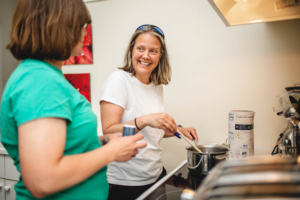 How does a focus on gratitude impact mental health? Research shows it can reduce stress and improve physical and psychological health. “Gratitude can provide benefits to people’s physical and mental health and improve their relationships,” wrote Nicole Tetreault, PhD, recently in Psychology Today. “The holiday season offers the perfect opportunity to stop and express thankfulness for the good things.”
How does a focus on gratitude impact mental health? Research shows it can reduce stress and improve physical and psychological health. “Gratitude can provide benefits to people’s physical and mental health and improve their relationships,” wrote Nicole Tetreault, PhD, recently in Psychology Today. “The holiday season offers the perfect opportunity to stop and express thankfulness for the good things.”
According to the Healthbeat blog of the Harvard Medical School, each holiday season features “high expectations for a cozy and festive time of year. However, for many this time of year is tinged with sadness, anxiety, or depression.” Certainly, major depression or severe mental illnesses like schizophrenia and bipolar disorder require professional help.
“But what about those who just feel lost or overwhelmed or down at this time of year?” asked the Healthbeat blog. “Research (and common sense) suggests that one aspect of the Thanksgiving season can actually lift the spirits, and it’s built right into the holiday—being grateful.” A deliberate gratitude shift means consciously focusing on what’s good instead of dwelling on what’s missing. It can be an effective tool in the treatment of mental health issues.
Bernadette Robinson is a life skills coach and transitional living coordinator at Colorado Recovery. “For Thanksgiving, we get our transitional, outpatient, and independently living clients as well as some staff together this Wednesday for a shared meal so everybody can feel their support system through the holidays,” she says. “We’re encouraging our clients to come early and prepare some of the items together so there’s a theme of gratitude connected to cooking the meal together and realizing the life skills that come with cooking together.”
At Colorado Recovery, the holidays are about celebrating and community building, but also a little bit about health coaching. “Knowing how to cook nutritious, healthy meals and what it takes to cook together is important,” says Robinson. “We have some outpatients that come with their own ideas and ingredients. We also had meetings with our transitional clients to figure out what they wanted to make for Thanksgiving.”
Throughout the holiday season, clients are encouraged to (re)connect with their families but “we also remind them that they have a family here with us,” says Robinson. “We encourage journaling as the end of the year can be a time of reflection and contemplation of what’s important in your life and what to be grateful for.”
Colorado Recovery approaches mental healthcare based on a path of self-reliance through developed practiced skills. This non-institutionalized social recovery offers comprehensive care supported by an expert treatment team that engages patients in increasing community participation. Boosting self-confidence with gratitude and mindfulness exercises, challenging hikes, and self-expression in art groups are important elements of our treatment approach.
At Colorado Recovery it is our mission to help adults with serious mental health issues stabilize their illness, minimize symptoms, improve functioning, and enhance each person’s social inclusion, quality of life, and sense of meaning in life.
Colorado Recovery transitioned to a non-profit organization in June. This pivotal change underscores our commitment to providing exceptional care and support to our clients while ensuring greater accessibility through scholarships and donations.
If you have questions about our recovery model or our services to treat schizophrenia, bipolar disorder, and similar mental illnesses, call us at 720-218-4068 to discuss treatment options for you or the person you would like to help.

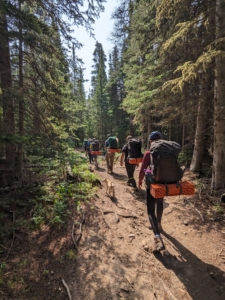 Getting out into nature can mean walking, hiking, biking, kayaking, or other similar activities. Stepping outside can help people keep a healthy weight or even lose weight by increasing activity levels.
Getting out into nature can mean walking, hiking, biking, kayaking, or other similar activities. Stepping outside can help people keep a healthy weight or even lose weight by increasing activity levels.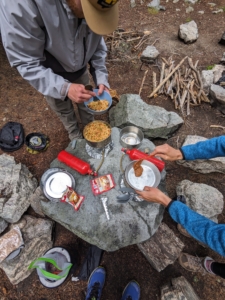 They also learned what to expect on the trip in terms of weather conditions, temperatures (day and night), food, gear, safety, wildlife, and proper leave-no-trace waste disposal practices.
They also learned what to expect on the trip in terms of weather conditions, temperatures (day and night), food, gear, safety, wildlife, and proper leave-no-trace waste disposal practices. Art can be helpful in healthcare, whether as prescribed therapy, something you participate in for fun, or simply as part of the environment. “Creative arts therapy is used to help treat mental health conditions because it can improve focus, assist with processing emotions, improve communication, and increase self-esteem,” wrote the
Art can be helpful in healthcare, whether as prescribed therapy, something you participate in for fun, or simply as part of the environment. “Creative arts therapy is used to help treat mental health conditions because it can improve focus, assist with processing emotions, improve communication, and increase self-esteem,” wrote the 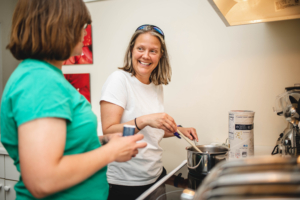 When working with our clients, we continually stress that their illnesses can be managed and that they can maintain a sense of normalcy in their lives if they work on five basic skills that contribute to managing their conditions.
When working with our clients, we continually stress that their illnesses can be managed and that they can maintain a sense of normalcy in their lives if they work on five basic skills that contribute to managing their conditions.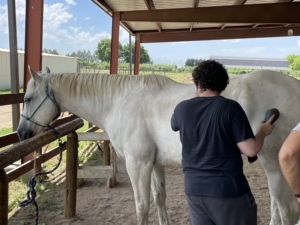 Animals can provide great emotional support for human beings. Beyond the loving pet-owner relationship that many of us have experienced, animals are also used in therapeutic settings to help clients navigate challenging emotional experiences.
Animals can provide great emotional support for human beings. Beyond the loving pet-owner relationship that many of us have experienced, animals are also used in therapeutic settings to help clients navigate challenging emotional experiences. At Colorado Recovery, clients learn how to live successfully with their mental illness in an atmosphere of caring support.
At Colorado Recovery, clients learn how to live successfully with their mental illness in an atmosphere of caring support.
